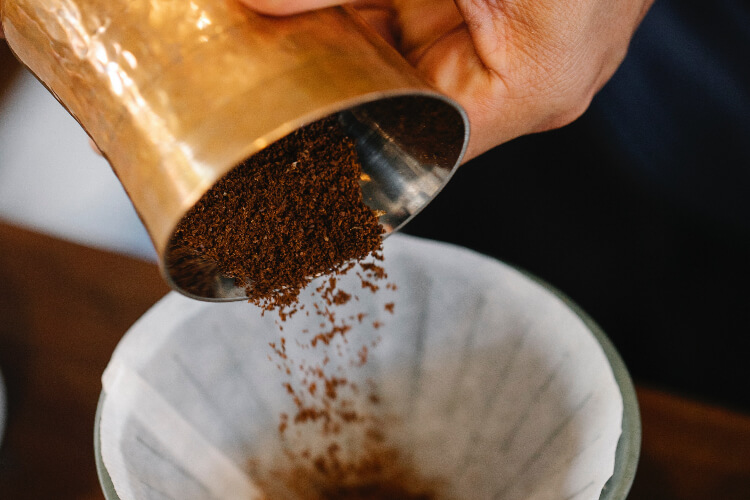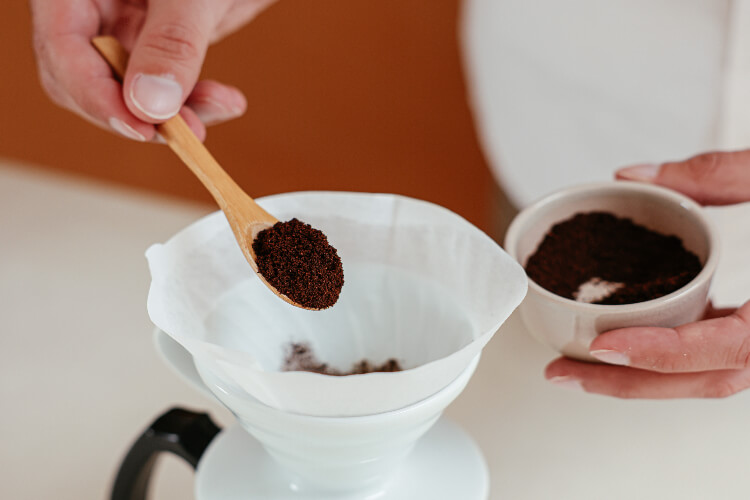
Can You Eat Coffee Grounds For Caffeine
Sometimes you don’t have time for a delicious cup of coffee. Maybe you didn’t notice the time, or you must leave in a hurry, and coffee from your favorite shop is just too far out of the way. Well, fret no more! This article covers how many coffee grounds equal one cup of brewed coffee and how to substitute it if your supply starts to run low.

What type of coffee cup is right for me?
When choosing a coffee cup, there are many factors to consider. If you’re looking for the perfect caffeine fix, here are a few things to keep in mind:
- The size of the cup. If you’re looking for a quick caffeine jolt, a smaller cup is probably your best bet. But a larger cup is the way to go if you want to savor your coffee and enjoy the flavor.
- The material of the cup. Porcelain or ceramic mugs retain heat better than glass or plastic, so your coffee will stay hot longer. And if you’re looking for an eco-friendly option, try a reusable mug made from recycled materials.
- The style of the cup. Do you prefer a traditional face or something with more personality? There are many options, so take some time to browse and find the perfect one.
Do coffee grounds contain caffeine?
The short answer is yes, coffee grounds contain caffeine. The coffee bean, the method of roasting, and the degree of grinding significantly impact how much caffeine is present in coffee grounds. So, if you’re looking for a caffeine boost from eating coffee grounds, it’s important to research to ensure you’re getting what you’re looking for.
There are a few ways to maximize your caffeine intake from coffee grounds. First, opt for dark roast beans, as they tend to be higher in caffeine than light roast beans. Second, choose a coarse grind over a fine effort, as more surface area means more caffeine. And finally, don’t be afraid to experiment with different brewing methods to find one that works best for you.
So, if you’re looking for a little extra caffeine in your diet, coffee grounds may be a good option for you. Just be sure to research and understand how much caffeine you’re getting before downing a cup of joe!
How do you make your perfect cup of coffee with coffee grounds?
Brewing the perfect cup of coffee is an art and a science. Every coffee connoisseur has its own unique method for making its signature beverage. However, there are some basic guidelines that all coffee brewers should follow to make a delicious cup.
When using coffee grounds, the first step is choosing the right type of grind. The grind size will determine how long it takes for the coffee to extract, so it is important to experiment until you find the task that suits your taste. Once you have the perfect grind, it is time to add the coffee grounds to your brewer. The general rule is to use two tablespoons of coffee per six ounces of water.
After adding the coffee grounds, it is essential to let them steep for the appropriate time. This will ensure that all the flavor and caffeine are extracted from the beans. Once the coffee has finished brewing, it is time to enjoy your delicious cup of java!
Disadvantages to using coffee grounds to make plant-based drinks
When it comes to getting your caffeine fix, coffee grounds may not be the best option – especially if you’re looking for a plant-based drink. Here are a few reasons why:
- Coffee grounds can contain harmful chemicals.
- Coffee grounds can hurt the environment.
- Coffee grounds can be difficult to digest.
- Coffee grounds may not provide the same level of caffeine as other options.
So, while coffee grounds may be a convenient way to get your caffeine fix, there are some disadvantages to consider before using them in your next plant-based beverage.
Pros and cons for using coffee grounds instead of regular roasted beans.
There are pros and cons to using coffee grounds instead of regular roasted beans. Some say that coffee grounds give a more robust cup of coffee, while others find the flavor more intense and bitter.
Coffee grounds may also contain more caffeine than regular beans, so they could be a good option if you’re looking for a caffeine boost. However, coffee grounds can be hard to grind evenly, so your coffee may not be as consistent in flavor and strength. And finally, if you use coffee grounds from a different source each time, it can be hard to replicate the same cup of coffee twice.
Can you eat coffee grounds for caffeine?
Coffee grounds are a great source of caffeine – they contain more caffeine than coffee beans! Eating coffee grounds is an excellent option if you’re looking for a quick and easy way to get your caffeine fix. Just be warned that they can be pretty bitter!
What are coffee grounds?
Coffee grounds are the leftover coffee beans that have been brewed. They can be used to make coffee again, but many prefer to discard them. However, some people swear by eating coffee grounds for caffeine.
No scientific evidence supports the claim that eating coffee grounds will boost your caffeine, but some people report feeling more awake after doing so. If you’re interested in trying this method, consult your healthcare provider first, as consuming large amounts of coffee grounds could lead to gastrointestinal issues.
Do coffee grounds contain caffeine?
There is some debate on whether coffee grounds contain caffeine. Some people believe that caffeine is extracted during the brewing process, while others believe that it remains on the grounds.
If you want a caffeine boost from coffee grounds, it is best to avoid caution and assume they contain caffeine. This means you should limit your intake if you are sensitive to caffeine or trying to avoid it altogether.
How much coffee grounds contain caffeine?
Caffeine is a stimulant found in many foods and drinks, including coffee. Coffee grounds contain caffeine, but the amount can vary depending on the type of coffee and how it is brewed.
The average cup of coffee has about 95 mg of caffeine, but the espresso can have up to 200 mg. And while coffee grounds have less caffeine than coffee beans, they still pack a punch to energize your morning cup of joe.
Are there any benefits to eating coffee grounds?
There are a few benefits to eating coffee grounds. For one, coffee grounds contain a good amount of fiber. Fiber is essential for keeping the digestive system regular and helps to prevent constipation.
Coffee grounds also contain a small number of minerals, including magnesium, potassium, and calcium. These minerals can contribute to a healthy diet. Additionally, coffee grounds have a high concentration of antioxidants. Antioxidants help to protect the body against free radicals, which can damage cells and lead to disease.
Are there any risks associated with eating coffee grounds?
Coffee grounds are a popular ingredient in many energy drinks and supplements, as they are a natural source of caffeine. However, there are some risks associated with consuming them. Coffee grounds can contain mold and other toxins that can harm your health.
- Additionally, eating coffee grounds can lead to gastrointestinal discomfort and dehydration. If you’re considering adding coffee grounds to your diet, talk to your doctor to ensure it’s safe.

How can you eat coffee grounds?
You can’t eat coffee grounds! If you try, you’ll have a mouth full of gritty coffee. However, you can use coffee grounds in other ways to get a caffeine fix. For example, you can:
- Make a cold brew coffee concentrate: Cold brew coffee is less acidic than regular coffee and is also super easy to make. Just combine coffee grounds with water in a jar, let it sit overnight, and then strain it in the morning.
- Add them to hot chocolate: A little bit of coffee can boost the flavor of hot chocolate. Add a spoonful or two of grounds to your mug before adding the hot chocolate mix.
- Make a DIY energy drink: Mix coffee grounds with lemon juice and honey for a quick and easy energy drink. This concoction will give you a severe caffeine jolt, so drink it sparingly!
Conclusion
Whether or not you should eat coffee grounds for caffeine is ultimately up to you. Some people swear by it as a way to get an extra boost of energy, while others find that it gives them an upset stomach.
If you decide to try it, be sure to start with a small amount and see how your body reacts before increasing your intake.
